A Beautiful or familiar fragrance can change your mood. If you tend to zone out or freeze when stressed, surround yourself with smells that are energizing and invigorating. If you tend to become overly agitated under stress, look for scents that are comforting and calming. Smell is the strongest of the senses and is best able to influence brain activity. Olfactory bulbs are part of the limbic system and directly connect to the areas of the brain that process emotion and learning. “This is one of the reasons why so often something that we smell will trigger a memory or remind us of something or someone,” says Beverley Hawkins, owner of the Vancouver-based West Coast Institute of Aromatherapy.
Here are a few suggestions on how to relax yourself using the sense of smell.
Did You Know?
Aroma Tech[1] list some interesting facts about the sense of smell. They also offer custom fragrance creation, differs, and scent samples. View the complete article here.
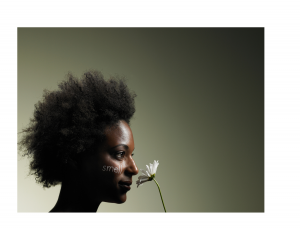
- The sense of smell works 24 hours a day and is the one human sense that cannot be switched off.
- The human sense of smell affects 75% of daily emotions and plays an important role in memory.
- The human nose is believed to be able to detect up to 350,000 chemicals. Emotion can be communicated by smell.
- There are suggestions that smell can influence mood, memory, emotions, mate choice, immune system, and hormones.
- Scenting does not impact judgment and has been tested to prove that it cannot cause obsessive behavior. Academics and researchers agree that scents are effective simply because they create a mood that validates intentions.
- Smell amplifies the sense of taste. Try this… if peeled pieces of apple are placed in one bowl and peeled pieces of potato in another, and then the nostrils are held completed closed while a piece from one bowl is sampled, the two tastes are indistinguishable. That’s why a head-cold severely impacts your appetite and sense of taste
Essential oils not only help improve job performance but health, meaning employees are less likely to take sick time. “Essential oils have anti-viral, anti-bacterial and anti-fungal properties and using them in an environment where there are a lot of people can help to keep germs at bay,” says Hawkins. Inhaling essential oils activates the hypothalamus – the area of the brain which sends messages to other parts of the body. “A simple inhalation of an aroma can cause many changes in the body,” says Hawkins, including activating the immune system, affecting blood pressure and stimulating digestion.[2]
In the article, 6 Scents That Can Transform Your Mood and Productivity, Lisa Evans states: Aromatherapy probably isn’t the first tool you think of to help boost your productivity and grow your business, but maybe it should be.
• Light a scented candle or burn some incense.
• Lie down in sheets scented with lavender.
• Smell the roses or another type of flower.
• Enjoy the clean, fresh air in the great outdoors.
• Spritz on your favorite perfume or cologne.
You can also try:
- Sipping on tea or coffee.
- Baking cookies.
- Creating fragrance jewelry.
- Enjoying steam treatments/facials. [3]
- Changing the sheets/drapes in the house – use pillow/ fabric sprays for cloth furniture.
- Using a diffuser or place oils in a humidifier.
- Soaking in a nice aromatherapy bath.
- Visiting a floral shop or order fragrances online.
World Health Net: Aromatherapy
Brief List of Scents to Manipulate Basic Emotions[5]
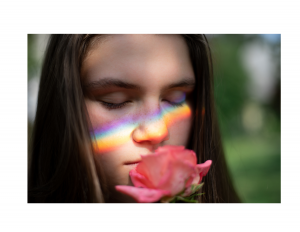
Below is a brief list of fragrances and their effects on emotions. Many of these fragrances have been used for centuries getting the same results.
Scents to Relieve Anger: Chamomile, Jasmine, Patchouli, Rose, and Ylang-ylang.
Scents to Relieve Anxiety: Bergamot, Cedarwood, Cypress, Frankincense, Hyssop, Lavender, Marjoram, Myrrh, Neroli, Orange, Peach, Rose, Rose Geranium, and Violet Leaf.
Scents to Increase Confidence: Frankincense, Jasmine, Patchouli, and Sandalwood.
Scents to Ease Depression: Bergamot, Clary Sage, Grapefruit, Jasmine, Lavender, Lemon, Lemon Balm, Lemon Verbena, Neroli, Orange, Petitgrain, Rose Geranium, Sandalwood, Tangerine, and Ylang-ylang.
Scents to Improve Memory: Bay Laurel, Jasmine, Lavender, Lemon, and Rosemary.
Scents to Ease Sorrow: Clary Sage, Cypress, Fir, Marjoram, Rosemary, and Sage.
Scents Used as Aphrodisiacs: Jasmine, Rose, Sandalwood, Vanilla, and Ylang-ylang.
Scents to Invigorate and Overcome Fatigue: Angelica, Benzoin, Camphor, Cardamom, Cinnamon, Clove Basil, Cypress, Eucalyptus, Fennel, Lemon, Peppermint, Pine, Sage, and Spiced Apple.
Scents to Deal with Stress, Nervous Tension, and Insomnia: Bergamot, Chamomile, Cinnamon, Cloves, Frankincense, Lavender, Lemon, Marjoram, Myrrh, Neroli, Nutmeg, Orange, Petitgrain, Rose, Sandalwood, Sweet Melissa, Valerian, Vanilla, Violet, and Ylang-ylang.
Scents to Calm Irritability: Chamomile, Neroli, Rose, and Rose Geranium.
These scents can be released through various means which include:
Atomizer – The scent is dispersed into the air as a very fine spray.
Bath – Mixing an essential oil with salts, milk, or sesame oil and then mixing it into your bath water can increase the pleasure of your bathing experience. The salts, milk, and sesame oil act as an emulsifier causing the oils to disperse into the water rather than just floating on the top. A good ratio to use is 5-10 drops of essential oil to ½-1 cup of salt, milk, or sesame oil.
Diffusion – any method or device that disperses small molecules of essential oil into the air. This is the most popular way to use essential oils. Common diffusers include: candle diffusers, electric heat diffusers, and cold air nebulizing diffusers.
Facial Steam – add 1-5 drops of essential oil to a hot pot of water. Drape towel overhead forming a tent with your face over the pot.
Hot Compress – to create a hot compress, add 10 drops of oil to 4 ounces of hot water. Soak a piece of cloth – flannel works well. Place a cloth over the treatment area.
Inhalation – any method of using the oils that allows them to be inhaled. This could include diffusers, atomizers, hot or cold compress, facial steam, and hot baths. 1-2 drops of essential oil can also be added to the palms of your hand. Rub hands together and then inhale deeply.
Massage – Essential oils must be diluted with a carrier oil to create oils safe for a massage. (Some oils are too hot when heated for use on the skin.) The ratio is 6-60 drops of essential oil to 1 ounce of carrier oil.
View the original article here.
- https://aromatechscent.com/pages/what-is-scent-science?wickedsource=google&wickedid=463958530245&wtm_term=&wtm_campaign=11105783505&wtm_content=108589194853&wickedplacement=&wickedkeyword=&gclid=CjwKCAiAkan9BRAqEiwAP9X6UW2zCVqWgAYjrbbZotC201Kv13lrcj95f0N6cC-lrJ-reVgqTaMzMhoCnbIQAvD_BwE ↵
- Evans, Lisa. “6 Scents That Can Transform Your Mood and Productivity.” Entrepreneur, 8 Oct. 2012, www.entrepreneur.com/article/224575. ↵
- https://www.worldhealth.net/forum/topic/1038/ ↵
- CHERVONSKY, LIZA. “Using Your 5 Senses To Self-Soothe.” Think Clinical Psychologists, 2017, www.thinkclinicalpsychologists.com.au/2017/09/04/using-your-5-senses-to-self-soothe/. ↵
- https://www.worldhealth.net/forum/topic/1038/ ↵

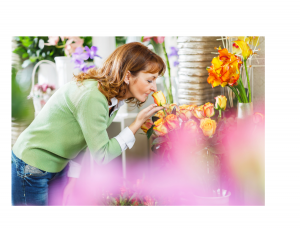
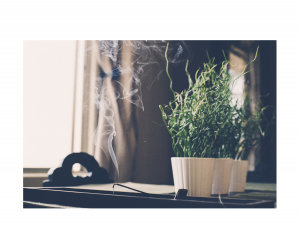
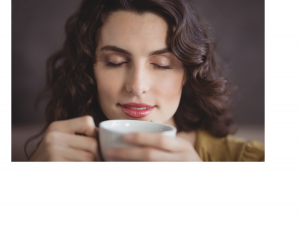
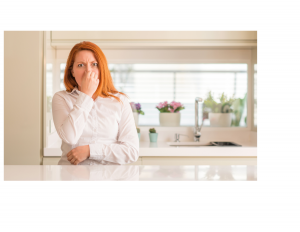

Feedback/Errata